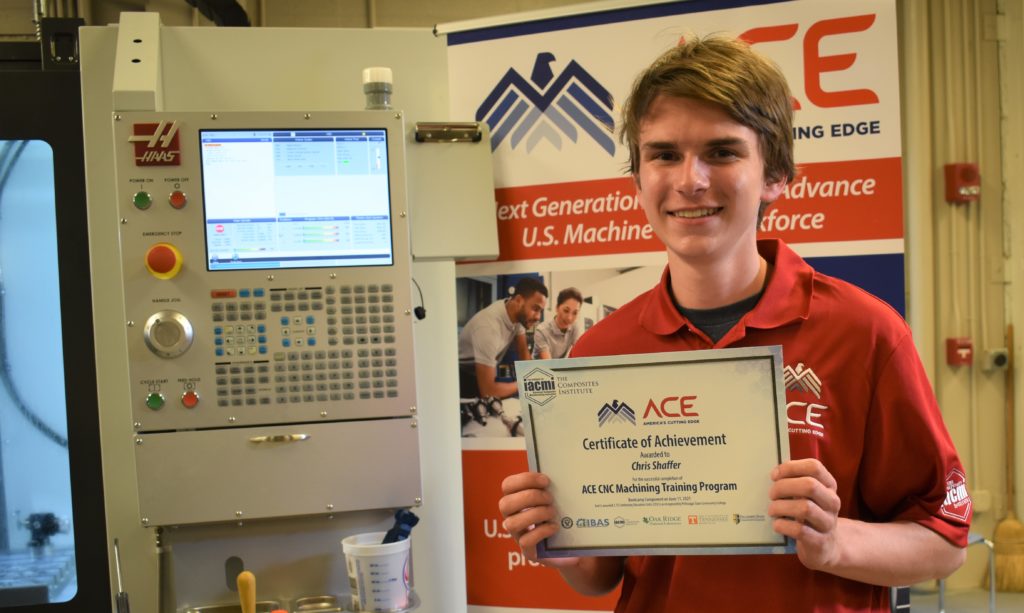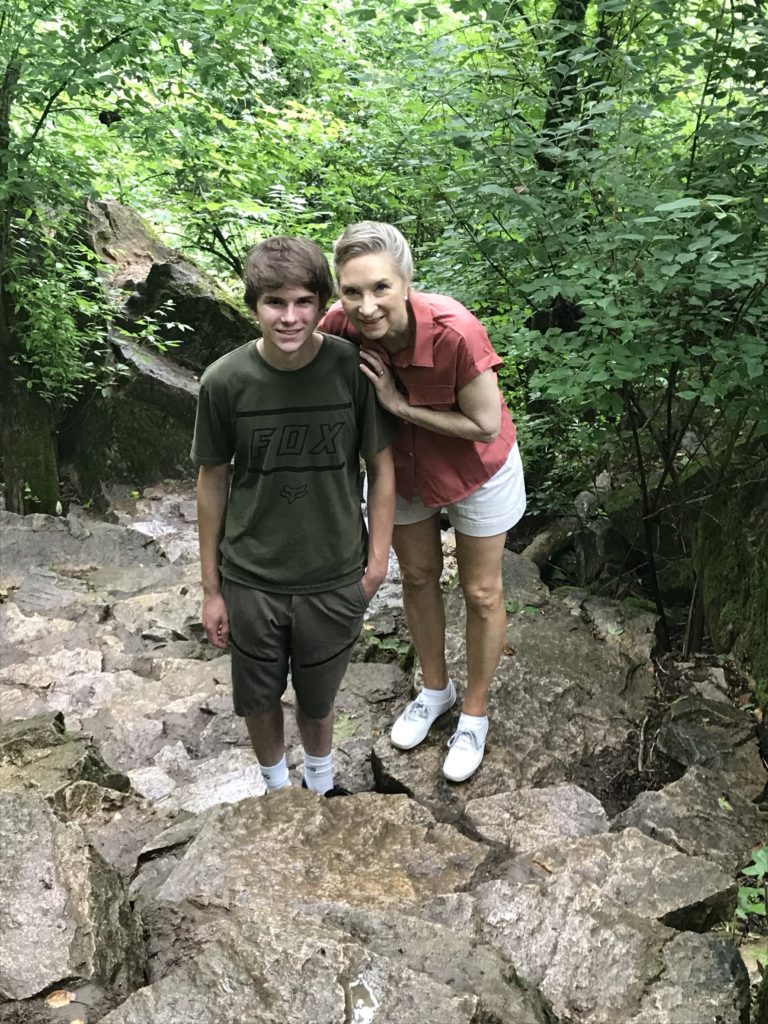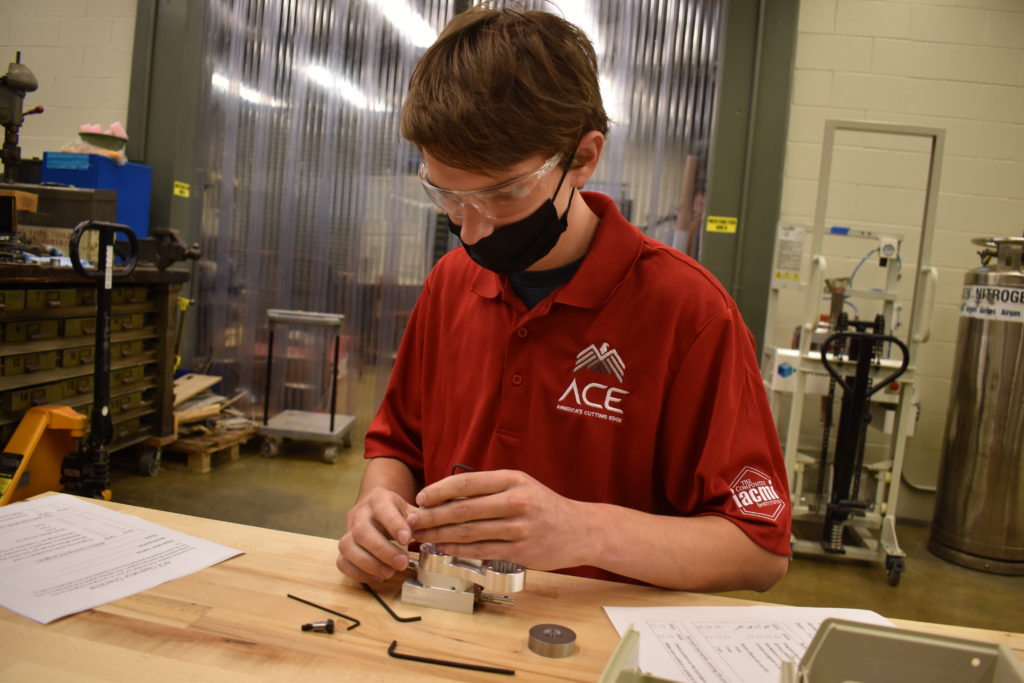Dear Dr. Schmitz,
I just wanted to let you know that Lawrence Livermore National Laboratory extended me a job offer as a machinist apprentice. I will be starting in June as soon as I graduate from high school. I really appreciate you and the ACE program. It helped me to decide on being a machinist as a career.
Thank you!
Chris Shaffer

May 20, 2022 — Nearly one year after taking the ACE CNC machining online and in-person training, Chris Shaffer, an 18-year-old high school senior from Danville, California, is ready for an exciting career opportunity in manufacturing. “I was interested in machining as a possible career path,” says Shaffer, “but I wasn’t completely sure because I hadn’t had much hands-on experience. The ACE program was a huge part in helping me determine this is something I wanted to do for a living. I couldn’t find too many other things where I felt that ‘at home’.”
Shaffer learned about America’s Cutting Edge (ACE) in May 2021 from a neighbor who worked at Lawrence Livermore National Laboratory (LLNL) in Livermore, CA. The neighbor had previously worked with Dr. Tony Schmitz, an engineering professor at the University of Tennessee, Knoxville who developed the ACE curriculum, and he knew the online course would interest Shaffer. “I really enjoyed the online course, because I knew a lot about the general concepts of machining, but the course went more in-depth,” adds Shaffer. “There was a lot of technical knowledge like chip formation that I hadn’t heard before.”


When he learned he could get one week of free hands-on CNC instruction and experience, he and his parents hopped on a plane to Tennessee. Shaffer had never worked on a CNC machine and had hardly ever left the San Francisco Bay Area. “I looked at it as it’s a new place, and I’m ready to explore.” What stood out to Shaffer about the in-person training was the amount of problem solving involved. “In machining there are so many different ways you can go about solving one issue, and it might take a whole team of people to figure it out. There’s no one right answer, which I really like.”
Within days of returning from the ACE bootcamp, Shaffer began a summer job at Mission Tool and Manufacturing in Hayward, CA. He was grateful that ACE had given him a jump on knowledge and confidence around CNC machines and was able to progress in tasks fairly quickly. During the school year, he advanced to working on weekends.
Shaffer also started a machining club with two mills and a lathe in the auto shop of his school, San Ramon Valley High School. Initially, 35 students expressed an interest, but he mentored five on whatever project they wanted to make. One student machined an exhaust manifold for a go-kart; another made a stand for his microphone he uses in a home studio. The most popular items were custom jewelry–rings that were quick, easy, and engravable.
Shaffer says there are lots of kids like him that could benefit from more exposure to manufacturing. “I like to work with my hands, I like to problem solve, I like to solve puzzles. Academics aren’t necessarily my thing. I still like learning, but I learn in a different way. I know there a lot of kids in the same boat as me. If you told them about machining and show them what it’s all about, they’d be interested in it.”
Shaffer explored the college option but decided to apply for the Machinist Apprentice Program offered by LLNL, where he was one of four new apprentices chosen for 2022. The program will take four years and offer eight 1,000-hour training periods to prepare the group in a variety of skills including target fabrication and optics, advanced metal and polymer 3D printing, laser processing and etching, and electroplating and part verification. The program has graduated more than 200 machinist apprentices since 1954.
“Everything about the machinist program makes me proud,” said LLNL manufacturing supervisor Jason Carroll, coordinator for the Machinist Apprentice Program. “I feel that I am giving back to the program that gave me so much. Most of our graduates feel the same way, and invest their time and energy helping the next class of apprentices.”
Carroll confirms apprentices work with challenging and sometimes exotic materials, and will develop mechanical skills, strong attention to detail, and critical thinking focused on problem solving, accuracy and safety. Those skills and attributes are essential to meeting LLNL’s mission goals of strengthening the United States’ security by developing and applying world-class science, technology, and engineering.
“I really hope the lab is a place I can stay and put down roots,” shares Shaffer. “I’ve heard it’s a welcoming, fun work environment. They take care of the workers. I’d like to work there as long as possible.” His starting salary is $28 an hour plus benefits, which is nearly $60,000 a year, and he’ll finish with a four-year journeyman certificate without student debt. Shaffer plans to save up the money he’ll be earning the next four years by living at home so that he can buy his own home by age 22.
He has encouraged other high school students to explore the ACE program, especially if they’re not sure about their career path, and offers this advice: “Be creative and don’t be close-minded. Even if you think there’s only one way to do something, there’s probably another way. When you’re with a team of people in machining, always voice your opinion because you can build upon everyone’s ideas and find solutions to your problem.”
Register for ACE online at iacmi.org/ace
ABOUT ACE
There is an urgent and growing need in the U.S. machining and machine tool industry for skilled individuals – operators, engineers, designers and more – for 30,000 machining companies across the country. America’s Cutting Edge (ACE) is a national initiative to restore the prominence of the U.S. machine tools sector. The ACE training focuses on Computer Numerical Control (CNC) machining fundamentals but is geared towards anyone interested in manufacturing, from high school students to experienced machinists looking to expand their skills. Both the 6-hour online course and the 30-hour in-person training requires no prior experience and is offered at no cost. ACE is supported by the U.S. Department of Defense (DoD) Industrial Base Analysis and Sustainment (IBAS) Program from the Office of Industrial Policy. ACE brings together the scientific expertise of the Department of Energy’s Oak Ridge National Laboratory (ORNL), advanced training tools and techniques developed at the University of Tennessee, Knoxville (UTK), and the workforce development leadership of IACMI – The Composites Institute. More than 2,300 people from all 50 states are engaged in the online training that began in December 2020, and in-person training is expanding from Tennessee to hubs in North Carolina and Texas in the next few months. Machining and machine tools are at the foundation of America’s manufacturing capability and its global competitiveness.
